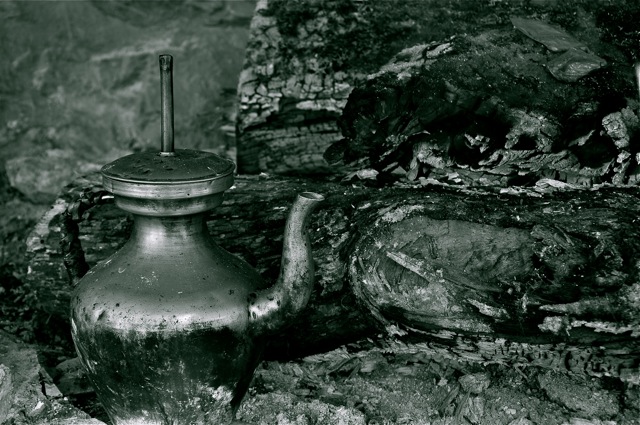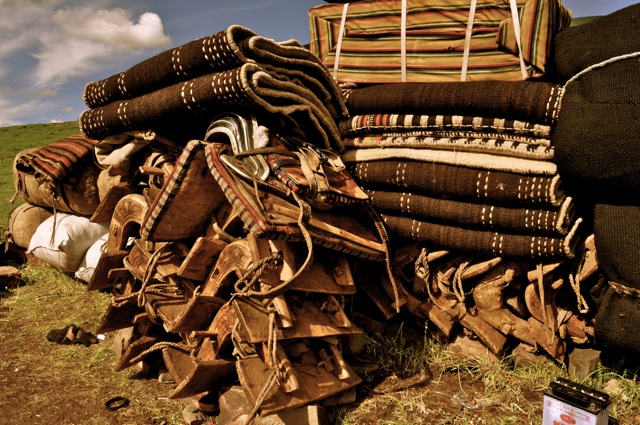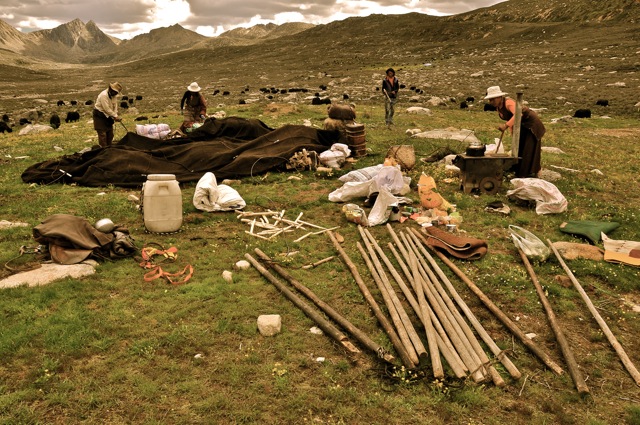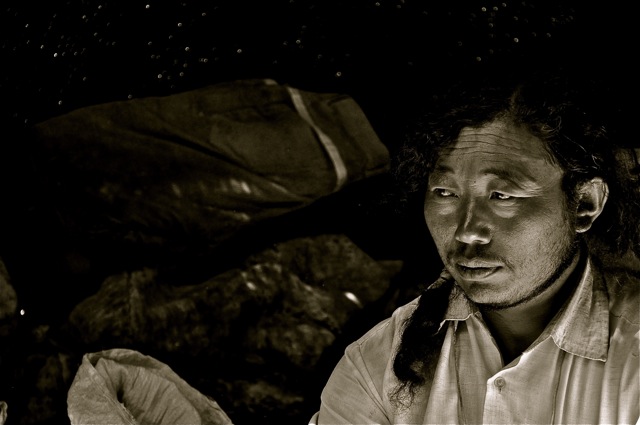Few can claim to live as simply and as absolutely efficiently within (and atop) their environment as the nomads (ndrog’ba) who have long learned to survive and thrive well above 4,000 metres. Closer to the sky than most, their lives are shorn down to essentials, and precious few luxuries. One of the great fuels and treasures was ‘ja‘ (tea).

During many visits with Ajo and Omu over the course of years to their various seasonal homes, the bare minimum of ‘things’ always struck the mind. Like so much that is hidden and understated about these people, their role as prime consumers of tea along the Tea Horse Road has gone largely undocumented.

- Only what is absolutely needed is taken…tea was inevitably one of those necessities.
Tea, could always be found and was always craved and in fact much of the tea in history that travelled along the Tea Horse Road was destined for the smoky yak wool tents of the nomads. As one old saying of the nomads goes, “We waited for the caravans bringing tea like we waited for family”.
Within Ajo and Omu’s tent, tea was a constant, whether flowing, being prepared, or waitng. Most often in its bamboo and rattan cylindrical containers, bricks of the stuff inevitably sat close to the altar, occupying a place of rare privilege in the lives of truly stoic people.

Cooked rather than infused, with additions of thick butter globs and salt, a kettle would be tucked into the embers and kept at the ready day and night.
Of tea, Ajo once said, “Tea is a food, it is something valued from far away, and it is something that no nomad would ever leave the tent without first sipping.”

Ajo, like his people, wasn’t given to much excess talk, but tea, yak wool, and the weather occupied both his thoughts and words to an almost obsessive degree.
It is as concise a description as any I’ve heard about tea’s enduring vitality.

About JeffFuchs
Bio
Having lived for most of the past decade in Asia, Fuchs’ work has centered on indigenous mountain cultures, oral histories with an obsessive interest in tea. His photos and stories have appeared on three continents in award-winning publications Kyoto Journal, TRVL, and Outpost Magazine, as well as The Spanish Expedition Society, The Earth, Silkroad Foundation, The China Post Newspaper, The Toronto Star, The South China Morning Post and Traveler amongst others. Various pieces of his work are part of private collections in Europe, North America and Asia and he serves as the Asian Editor at Large for Canada’s award-winning Outpost magazine.
Fuchs is the Wild China Explorer of the Year for 2011 for sustainable exploration of the Himalayan Trade Routes. He recently completed a month long expedition a previously undocumented ancient nomadic salt route at 4,000 metres becoming the first westerner to travel the Tsa’lam ‘salt road’ through Qinghai.
Fuchs has written on indigenous perspectives for UNESCO, and has having consulted for National Geographic. Fuchs is a member of the fabled Explorers Club, which supports sustainable exploration and research.
Jeff has worked with schools and universities, giving talks on both the importance of oral traditions, tea and mountain cultures. He has spoken to the prestigious Spanish Geographic Society in Madrid on culture and trade through the Himalayas and his sold out talk at the Museum of Nature in Canada focused on the enduring importance of oral narratives and the Himalayan trade routes.
His recently released book ‘The Ancient Tea Horse Road’ (Penguin-Viking Publishers) details his 8-month groundbreaking journey traveling and chronicling one of the world’s great trade routes, The Tea Horse Road. Fuchs is the first westerner to have completed the entire route stretching almost six thousand kilometers through the Himalayas a dozen cultures.
He makes his home in ‘Shangrila’, northwestern Yunnan upon the eastern extension of the Himalayan range where tea and mountains abound; and where he leads expeditions the award winning ‘Tea Horse Road Journey’ with Wild China along portions of the Ancient Tea Horse Road.
To keep fueled up for life Fuchs co-founded JalamTeas which keeps him deep in the green while high in the hills.




